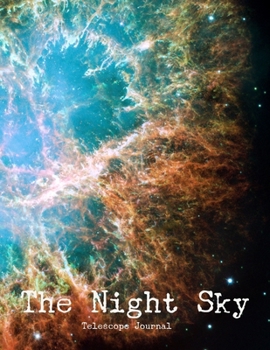The Night Sky Telescope Journal: Record planets, moons, stars, nebulae, galaxies, and comets.
The Night Sky Telescope Journal
There are several approaches to recording observations in the night sky ranging from naked eye observations and interpretations to telescopes.
Homeschooling Parents Team this journal with a worksheet on what objects they saw in the sky, space to chart out stars they spotted, or to write down how watching the sky made them feel.
Beginner Telescope Astronomers Everyone has to start somewhere, and this is the perfect journal.
Seasoned Astronomers The Night Sky Telescope Journal contains prompts to focus on astrological movements and their meanings.
FEATURES: US Letter Size 8.5 x 11"), 55 lb whitepaper, glossy finish cover for durability, perfect bound, 110 pages, black ink interior, wide ruled lines, paper weight recommended for pencil and ballpoint pen use only (not suitable for markers or heavy inks).
Prompts:
Finder Grid Box
Date
Time
Location
Telescope
Sky Conditions
Object
Field drawing sketch areas for low & high power
References for eyepiece, Magnitude, filter & FOV
Notes area to jot observations, meanings & details
Cover Image: This is a mosaic image, one of the largest ever taken by NASA's Hubble Space Telescope of the Crab Nebula, a six-light-year-wide expanding remnant of a star's supernova explosion. Japanese and Chinese astronomers recorded this violent event nearly 1,000 years ago in 1054, as did, almost certainly, Native Americans. The orange filaments are the tattered remains of the star and consist mostly of hydrogen. The rapidly spinning neutron star embedded in the center of the nebula is the dynamo powering the nebula's eerie interior bluish glow. .





